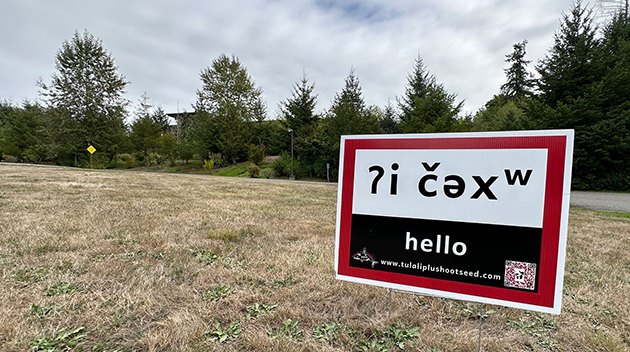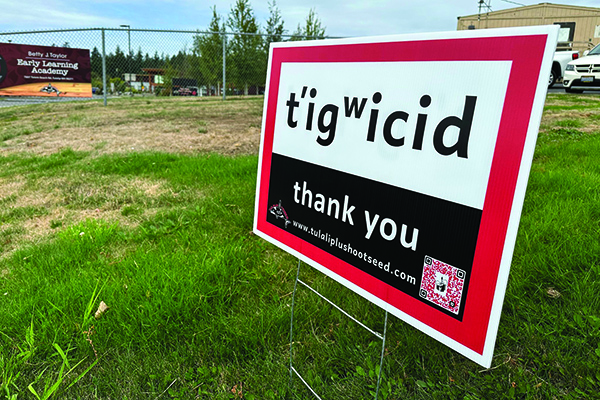
By Kalvin Valdillez, Tulalip News
An inspiring cultural reclamation is happening throughout Native America as tribes are actively working to restore their traditional languages. Once outlawed and considered a punishable offense during the years of assimilation, many Native languages were all but lost. But thanks to each respective tribe’s knowledge keepers and traditional linguists, there has been a resurgence of the dialect of our ancestors over the years.
Within the sduhubš nation, the revitalization of the Lushootseed language seems to grow stronger with each decade that passes. Ever since Hank Gobin and Toby Langen set the foundation in the early 90’s, when the Lushootseed department was established, the language has spread amongst tribal families and is now often used conversationally.
Many of today’s traditional speakers were introduced to the language by the Lushootseed department along their educational journey or through a course offered to the community. Today, the department has grown considerably in size as a number of tribal members fell in love with the language and developed a passion for sharing that knowledge with the next generation.
Known as the Language Warriors, the team of culture bearers teach Lushootseed to tribal members as young as newborn babies, infants, and toddlers at the Betty J. Taylor Early Learning Academy, as well as to students at every grade level within the Marysville School District. The department also teaches college courses and frequently holds community classes and events to ensure the language is accessible to Tulalip’s members and its community.
Keeping with the times, the Lushootseed department offered online lessons and storytelling videos through the stay-at-home ordinance during the pandemic. They also developed an educational app geared towards kids that is based around foods. And we’d be remiss to mention their website, an online Lushootseed database that provides the spelling of a variety of words and phrases in the Lushootseed alphabet as well as an audio clip of the pronunciation of each word. The website also includes several video lessons and as well as traditional stories. Their homepage is updated regularly and shares the department’s upcoming events and activities.

If you were to visit www.tulaliplushootseed.com this very moment, you would find three phases listed at the top – ʔi čəxʷ, huyʔ, and t’igʷicid which translates to hello, goodbye, and thank you in English. The Lushootseed department chose these three phrases to kick-off a new initiative aimed at getting the entire community speaking the language on an everyday basis.
It’s been only a few weeks since the department announced the initiative via a cute video titled ‘Are You Smarter Than a 5-year-old?’, in which a tribal youth effortlessly spoke the three phrases and gave the definition of each word. The video ends with the tagline ‘get your Lushootseed on’, and challenges all of Tulalip to implement these words into their daily interactions and eradicate the English counterparts from their vocabulary completely.
“ʔi čəxʷ, t’igʷicid, and huyʔ are the three phrases we are starting off with – just trying to eliminate those three words in English, that is our goal for the rest of the year,” explained Interim Lushootseed Manager, Michelle Myles. “This was something fresh we could work on to get the community speaking the language. We were looking for ways to get the language out there to share it, where it’s not in the classroom, not with a teacher, and it’s something you could use with family members and share it in that way.”
With fall knocking on the door, the Lushootseed department recently provided a treat for the community in the form of eye-catching yard signs. Posted in highly visible areas, all throughout the 22,000-acre reservation, each sign displays one of the three phrases that local commuters can view and then in-turn practice while enroute to wherever their destination may be. For foot traffic, those active runners and walkers journeying across the rez, there is a QR code at the bottom of every sign. When scanned with a smartphone, the code will bring you to the Lushootseed department’s website where people can learn more about the challenge and hear the pronunciation of each phrase.
“These are three things that everyone can say,” exclaimed the Lushootseed department’s Video Producer/Director, Brian Berry, who has been instrumental in getting the initiative off and running. “It actually started here at the Lushootseed department. There are some signs here in the building that say, ‘English words we’re not going to use anymore’. That kind of got my brain spinning that we as employees and tribal members should replace these three phrases, using the Lushootseed ones instead of the English ones. The QR code will take you to our website. We got a little slot on there – three commercials that I put together, thirty second spots that we’re pushing out on Facebook, trying to get everyone to speak the language.”
The signs can be spotted all along Marine Drive, as well as in front of various department buildings and public spaces such as the Administration building, the Gathering Hall, the teen center campus, and the Tulalip Bay Marina. The signs are also located at the Betty J. Taylor Early Learning Academy, the 27th Ave. school campus which includes Heritage High and Quil Ceda Tulalip Elementary, as well as at the Marysville Getchell campus and the Marysville Pilchuck campus.

The effects of the initiative are already taking place as numerous governmental employees are utilizing the three phrases in their e-mails and in-person interactions. It’s amazing to see how the Tulalip people are reclaiming their language and are making strong efforts in preserving Lushootseed by passing down the teachings to current day citizens and the future leaders of Tulalip.
“This is who we are and where we come from,” expressed Michelle. “Lushootseed is part of our culture, and we should be able to embrace it and share it with everyone. It’s beautiful. I’ve been working at the department for over 20-some years now and it’s nice to see this freshness and all the new innovations we can use to inspire people to speak the language. It feels good. It’s awakening the language. And this initiative is keeping it awake, spreading it and sharing it with everyone.”
For more information about the initiative, the three phrases and how you can help spread the ancestral word, please visit the Tulalip Lushootseed website.